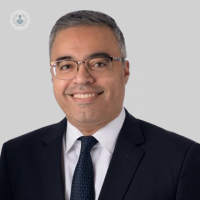Ask an expert: Adult ADHD: Part 1
Written by:We often hear about ADHD in childhood, but did you realise that many adults suffer from the same condition? We speak to leading psychiatrist Dr Khaled Helmy about the condition's symptoms, diagnosis and how it differs from childhood ADHD.
What is adult ADHD and how does it differ from childhood ADHD?
We usually call a client with adult ADHD if their childhood ADHD persists into/ until adulthood or if their first time being diagnosed is in adult life.
Usually, the prevalence of adult ADHD is around 4% and the prevalence of children with ADHD is around 2% of the population.
Not unusually, clients who are diagnosed with ADHD in childhood, will continue having ADHD in thier adult life. Some may be misdiagnosed with ADHD in childhood and become diagnosed for the first time in adult life with ADHD.
Usually, thos with childhood ADHD present with attention problems, hyperactivity problems and impulsive problems. These symptoms may persist into adult life, but the presentation may be different, as presentation differs according to age and possibly according to sex. As a result, the presentation of these behaviours may be different in adults than in children.

What are the symptoms and diagnosis of adult ADHD?
There are three different types of adult ADHD. The first type is called predominantly inattentive. With this type of ADHD, most of the symptoms consist of things such as easy forgetfulness, inattentiveness, misplacing things (such as keys, and pencils), forgetting appointments and disorganisation. These kinds of things are related to inattention.
The second type is predominantly hyperactive-impulsive, if most of your symptoms consist of hyperactivity and impulsivity. It is important to bear in mind that hyperactivity is not always physical, it can be mental and also be verbal.
Hyperactivity can cause restlessness and affect people mentally. They may experience procrastination because they have too many thoughts in their mind. It may be verbal, such as being talkative, oversharing or interrupting people.
Impulsiveness can be related to making impulsive decisions in your life, such as travelling, getting into a relationship or leaving a relationship, having a job or leaving a job with no other preparations. Additionally, some people with ADHD may have problems related to managing money; many fall into debt.
At times, they may speak without thinking. They may say something and regret saying it. I always say that sometimes people speak from their heart to their tongue without filtering their language.
Binge culture is a typical trait of ADHD. For example, with binge-watching, you may find yourself watching two or three episodes in one night, while you have work the next day. This is related to hyperactivity and impulsivity. Additionally binge eating and drinking are part of the presentation of ADHD.
The third type of ADHD is combined ADHD, when there is a mix between inattention, hyperactivity, and impulsivity.
Can the term ADHD be misleading at times?
I believe that the word ADHD, or attention deficit hyperactivity disorder is misleading, because when we talk about attention deficit, it's not really attention deficit, it can be hyper-focus on certain topics that the patient really likes, and it can also be inattentive in other areas.
We really should say that the patient is relatively inattentive. This makes the diagnosis difficult because, some will say that they can focus on spending three or four hours focusing on something but they cannot can’t focus at all on other things.
Furthermore, hyperactivity is not like hyperactivity in our mind, because the stereotypical thought about ADHD is the idea of children who climb the walls or jump from the window. In fact, it is not what ADHD says. Hyperactivity in ADHD is less than 15%.
What about the other 85% you may ask? They have hyperactive, mental racing thoughts. They want to do a lot of things. When they start something, they're passionate about it and they take it to a different level. However, after a while, they get bored, due to lack of dopamine, and +another thought becomes involved. As a result, they have too many thoughts in their mind and find themselves wanting to suppress them. They find that they are too talkative, perhaps oversharing or interrupting others.
They interrupt others because they know if they don’t immediately interrupt and tell people what they want to say, they would forget about it. I believe o I think the word ADHD issue is inaccurate for these reasons.
If you would like to speak to Dr Helmy about your ADHD, you can head over to his Top Doctors profile today to book an appointment.


